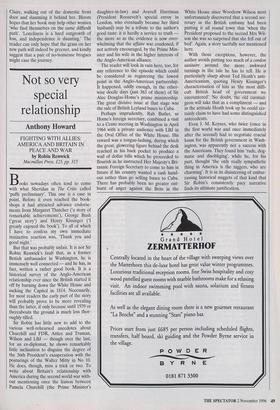Not so very special relationship
Anthony Howard
FIGHTING WITH ALLIES: AMERICA AND BRITAIN IN PEACE AND WAR by Robin Renwick Macmillan Press, £25, pp. 315 Books nowadays often tend to come with what Sheridan in The Critic called `puffs preliminary'. This one is a case in point. Before it even reached the book- shops it had attracted advance endorse- ments from Margaret Thatcher Ca story of remarkable achievements'), George Bush (`great story') and Henry Kissinger CI greatly enjoyed the book'). To all of which I have to confess my own immediate instinctive reaction was, 'Thank you and good night.'
But that was probably unfair. It is not Sir Robin Renwick's fault that, as a former British ambassador in Washington, he is immensely well connected — and he has, in fact, written a rather good book. It is a historical survey of the Anglo-American relationship ever since the British started it off by burning down the White House and sacking the Capitol in 1814. Necessarily, for most readers the early part of the story will probably prove to be more revealing than the latter, if only because until 1939 or thereabouts the ground is much less thor- oughly tilled.
Sir Robin has little new to add to the various well-rehearsed anecdotes about Churchill and FDR, Attlee and Truman, Wilson and LBJ — though over the last, for an ex-diplomat, he shows remarkably little inclination to disguise the degree of the 36th President's exasperation with the posturings of the Walter Mitty in No 10. He does, though, miss a trick or two. To write about Britain's relationship with America during the second world war with- out mentioning once the liaison between Pamela Churchill (the Prime Minister's daughter-in-law) and Averell Harriman (President Roosevelt's special envoy in London, who eventually became her third husband) may be a tribute to the author's good taste: it is hardly a service to truth — the more so as the evidence is now over- whelming that the affaire was condoned, if not actively encouraged, by the Prime Min- ister and his wife in the higher interests of the Anglo-American alliance.
The reader will look in vain here, too, for any reference to the episode which could be considered as registering the lowest point in the Anglo-American partnership. It happened, oddly enough, in the other- wise docile days (just 363 of them) of Sir Alec Douglas-Home's prime ministership. The great divisive issue at that stage was the sale of British Leyland buses to Cuba.
Perhaps imprudently, Rab Butler, as Home's foreign secretary, combined a visit to a Cento meeting in Washington in April 1964 with a private audience with LBJ in the Oval Office of the White House. His reward was a tongue-lashing, during which the great, glowering figure behind the desk reached in his back pocket to produce a wad of dollar bills which he proceeded to flourish as he instructed Her Majesty's Bri- tannic Foreign Secretary to come to him in future if his country wanted a cash hand- out rather than go selling buses to Cuba. There has probably been no greater out- burst of anger against the Brits in the White House since Woodrow Wilson most unfortunately discovered that a second sec- retary in the British embassy had been putting it all round town that 'when the President proposed to the second Mrs Wil- son she was so surprised that she fell out of bed'. Again, a story tactfully not mentioned here.
With those exceptions, however, the author avoids putting too much of a cordon sanitaire around the more awkward turnings in the tale he has to tell. He is particularly sharp about Ted Heath's anti- Americanism, quoting Henry Kissinger's characterisation of him as 'the most diffi- cult British head of government we encountered'. No doubt, the old curmud- geon will take that as a compliment — and in the attitude Heath took up he could cer- tainly claim to have had some distinguished antecedents.
Even J. M. Keynes, who twice (once in the first world war and once immediately after the second) had to negotiate crucial loans for the British government in Wash- ington, was apparently not a success with the Americans. They found him 'rude, dog- matic and disobliging', while he, for his part, thought 'the only really sympathetic thing in America is the niggers, who are charming'. It is in its disinterring of embar- rassing historical nuggets of that kind that Sir Robin's consistently pacy narrative finds its ultimate justification.


















































































 Previous page
Previous page